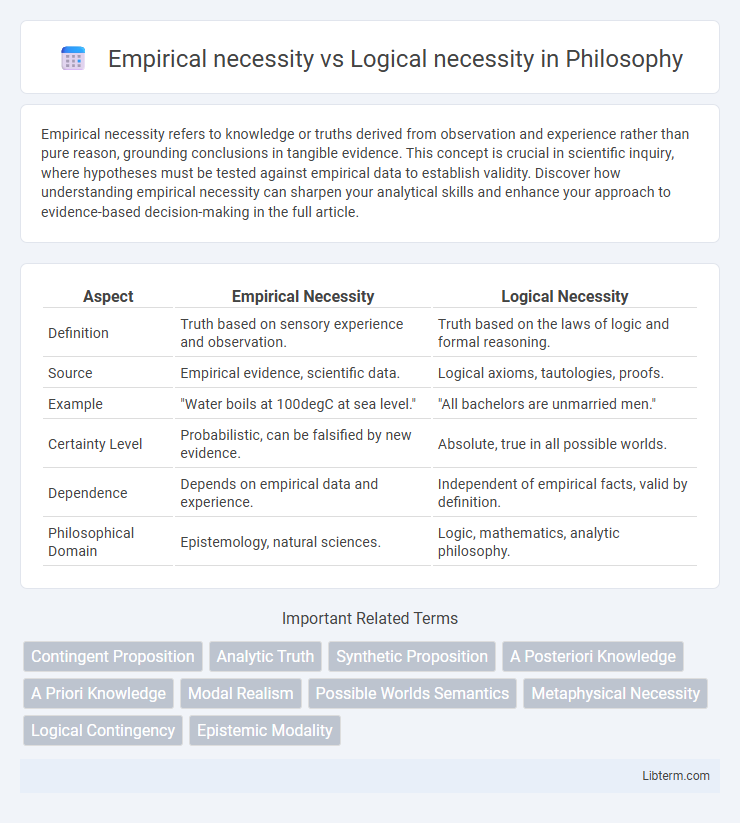Empirical necessity refers to knowledge or truths derived from observation and experience rather than pure reason, grounding conclusions in tangible evidence. This concept is crucial in scientific inquiry, where hypotheses must be tested against empirical data to establish validity. Discover how understanding empirical necessity can sharpen your analytical skills and enhance your approach to evidence-based decision-making in the full article.
Table of Comparison
| Aspect | Empirical Necessity | Logical Necessity |
|---|---|---|
| Definition | Truth based on sensory experience and observation. | Truth based on the laws of logic and formal reasoning. |
| Source | Empirical evidence, scientific data. | Logical axioms, tautologies, proofs. |
| Example | "Water boils at 100degC at sea level." | "All bachelors are unmarried men." |
| Certainty Level | Probabilistic, can be falsified by new evidence. | Absolute, true in all possible worlds. |
| Dependence | Depends on empirical data and experience. | Independent of empirical facts, valid by definition. |
| Philosophical Domain | Epistemology, natural sciences. | Logic, mathematics, analytic philosophy. |
Understanding Empirical Necessity
Empirical necessity refers to truths derived from observation and experience, grounded in empirical evidence and scientific methodology. It contrasts with logical necessity, which involves truths based on formal logic and reason independent of sensory data. Understanding empirical necessity relies on the verification of hypotheses through experimentation and the consistent reproducibility of results in real-world contexts.
Defining Logical Necessity
Logical necessity refers to statements or propositions that are true in all possible worlds due to their logical form, such as mathematical tautologies or analytic truths. These truths cannot be contradicted without resulting in a logical contradiction, making them true by definition rather than by empirical evidence. Unlike empirical necessity, logical necessity relies on deductive reasoning and the inherent structure of language and logic, independent of sensory experience.
Core Differences Between Empirical and Logical Necessity
Empirical necessity refers to truths that depend on sensory experience and observation, making them contingent and open to revision based on new evidence, such as scientific laws. Logical necessity involves truths that are true by definition and reason, immutable and universally valid regardless of empirical data, like mathematical axioms or tautologies. The core difference lies in empirical necessity's reliance on empirical verification versus logical necessity's foundation in formal logic and conceptual analysis.
Historical Context of Necessity in Philosophy
Empirical necessity arises from observations and facts about the natural world, grounded in sensory experience and scientific evidence, while logical necessity depends on the structure of reasoning and tautologies independent of contingent facts. Historically, philosophers like Hume challenged the notion of necessity in causal relationships, emphasizing empirical verification, whereas Kant introduced synthetic a priori judgments to bridge empirical and logical necessity. The evolution of necessity in philosophy highlights the tension between knowledge derived from experience versus that established through logical deduction.
Examples of Empirical Necessity in Science
Empirical necessity in science refers to conclusions or laws derived from observed data and experiments, such as Newton's law of gravitation, which is established through consistent empirical evidence. Unlike logical necessity, which is true by definition (e.g., mathematical truths like "all bachelors are unmarried"), empirical necessities depend on contingent facts about the physical world. Examples include the boiling point of water at 100degC under standard atmospheric pressure and the behavior of gases described by the ideal gas law, both grounded in experimental verification.
Illustrations of Logical Necessity in Mathematics
Logical necessity in mathematics is demonstrated through universally true statements such as "2 + 2 = 4," which hold independently of empirical observation or physical experience. Mathematical proofs exemplify logical necessity by deriving conclusions from axioms and established theorems via deductive reasoning, ensuring outcomes that are unconditionally valid. Unlike empirical necessity, which depends on sensory data and contingent facts, logical necessity guarantees statements true in all conceivable scenarios within a formal system.
Interplay Between Empirical and Logical Necessity
Empirical necessity depends on observational evidence and the consistent occurrence of phenomena within the natural world, whereas logical necessity arises from the internal coherence of propositions within formal systems. The interplay between empirical and logical necessity highlights how empirical data can inform logical frameworks, while logical analysis can refine or challenge interpretations of empirical findings. This dynamic interaction drives scientific progress by blending inductive observation with deductive reasoning to establish robust knowledge.
Challenges in Distinguishing Necessity Types
Distinguishing empirical necessity from logical necessity poses significant challenges due to their overlapping implications in various contexts. Empirical necessity depends on observational data and causal relationships, making it contingent and subject to revision, whereas logical necessity is grounded in tautologies and analytic truths, holding universally and a priori. The difficulty lies in identifying whether a necessity arises from inherent logical structures or from contingent empirical facts without presupposing one framework over the other.
Implications for Knowledge and Reality
Empirical necessity depends on observation and experience, implying that knowledge derived from empirical facts is contingent and subject to revision based on new evidence, which shapes our understanding of reality dynamically. Logical necessity arises from the inherent structure of language and reasoning, establishing truths that are universally valid and independent of empirical data, thus providing a stable foundation for certain knowledge. This distinction highlights that empirical knowledge informs our practical engagement with the world, while logical necessity underpins theoretical frameworks and conceptual clarity.
Contemporary Debates and Future Directions
Contemporary debates in philosophy emphasize the distinction between empirical necessity, which depends on observational evidence and scientific laws, and logical necessity, grounded in tautologies and analytic truths. Scholars explore how advancements in modal logic and metaphysics challenge traditional boundaries, particularly in analyzing counterfactuals and possible worlds semantics. Future directions involve integrating interdisciplinary approaches, such as cognitive science and artificial intelligence, to refine the understanding of necessity in knowledge representation and reasoning systems.
Empirical necessity Infographic

 libterm.com
libterm.com